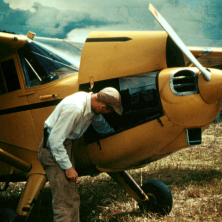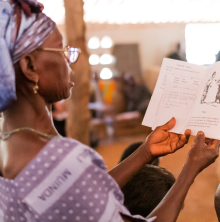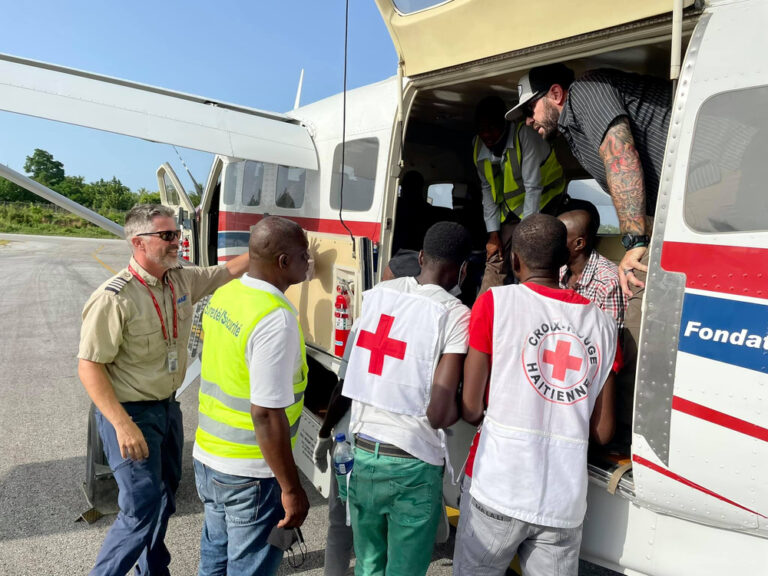Congolese people rescued by MAF return to help their country heal
Over the past 50 years, MAF’s ability to evacuate missionaries and humanitarian workers quickly in the event of an uprising has been critical to the survival of the Congolese church and the country’s recovery. And as the Church continues to grow and the country tries to heal, MAF is committed to being there.
MAF began service in the country now known as Democratic Republic of the Congo (DRC) in 1961, shortly after the African nation received its independence from Belgium. During the Congo Crisis in 1964, it was mainly western missionaries who needed MAF’s services to evacuate to safety. But in later years during the First and Second Congo Wars (1996 – 2003), many Congolese and NGO (nongovernmental organization) workers required lifesaving MAF flights.
While the more recent uprisings have led to fewer western missionaries returning, many Congolese who were saved on a “last flight out” have come back. They’re part of a growing number who are committed to God’s call to help DRC heal, both spiritually and physically.

When Dr. Alain Mukwege was 16 years old, in 1996, he and his family were evacuated by MAF. God had already spared his family from a deadly attack on their mission hospital, Lemera, where Alain’s father was a physician. A few days later they boarded the last MAF plane out of Bukavu. The situation was tense. The airport commander told the MAF pilot to leave immediately as a rebel army was spotted heading toward the airport. The pilot left all the luggage in order to fit as many people as he could on the plane, and took off just minutes before the airport fell under rebel control.
Alain reflects on that last flight and says, “We were grateful because our family could have been slaughtered. MAF really did a great thing for us.”
Now a research fellow at the Mayo Clinic in the U.S., Alain plans to return to DRC to work with his father, who started Panzi Hospital in Bukavu in 1999, in conjunction with a protestant church organization. The hospital is instrumental in treating female survivors of sexual violence and reproductive trauma, and aims to provide a holistic approach to healing.
Nyankunde, where MAF had a base, came under attack in 2002. As an accountant at the local hospital, Daniel Kasereka was targeted and needed to escape. He left on one of the last two MAF flights out of Nyankunde.
“David Jacobsson saved me when they were just about to kill me. I owe my life to him,” says Kasereka, who, after the war, started a reconciliation ministry, OEIL (Organisation, Evangélisation, Intercession et Libération) to bring different tribes together to heal from the hatred and pain caused by years of conflict. In late 2011, Kasereka and his team conducted an OEIL workshop in Nyankunde with the ex-militia who had ransacked the city––the same people who sought to kill him. These men publicly asked for forgiveness and have since become Christians. “The Lord has used Daniel to bring many, many people to the Lord, and healing to the region. Only He knows how many,” says MAF pilot David Jacobsson. About his role that day he adds, “It’s an incredible privilege… We just did what God put before us to do.”

This year marks the 10th anniversary of the attack on Nyankunde, where close to 2,000 were killed in 10 days and everything was destroyed, including the MAF hangar and staff homes. Today the population is back up to 10,000. The mission hospital, Centre Médical Evangélique, is operating again and is filled with doctors who feel called to be there. MAF Congolese staff maintain the airstrip and keep an eye on the MAF homes and facilities that have been gradually rebuilt over the past decade. MAF hopes to someday return its operations to Nyankunde when the security situation allows.
In the meantime, MAF operates from the eastern DRC city of Bunia, where the Shalom University of Bunia (USB) has been training Christian leaders for 50 years. Professor Kabuchungu is the director of the school’s Bible translation department. He and his family made it onto the last MAF flight out of Bunia in 2003 when conflict was at its peak. “It was like flying into heaven,” he said. Kabuchungu returned after the war to continue teaching at the University, where he says, “MAF is the only safe way students can come to study the Bible. Over land it is too dangerous.” Translation projects slowed by the war are now moving forward, and Kabuchungu’s students will be instrumental in bringing the Scriptures to new audiences.
As MAF remains committed to serving a country still reeling from the effects of war, the resolve of DRC Christians to rebuild their country remains stronger than ever.


